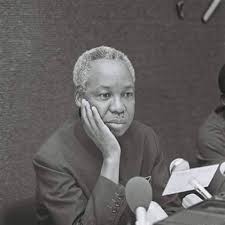Nyerere Was Africa's True Man Of The People
Julius Nyerere
By James N. Kariuki
Afro-pessimists of the world once glorified Tanzania's Julius Kambarage Nyerere by musing that he should not have been born African. More sincere admirers saluted him simply as 'one of the planet's best and brightest'. When he died in 1999, practically the entire world, including the General Assembly of the UN, grieved a terrible loss. An American Afro-optimist simply lamented tearfully: I would have followed him anywhere!
To many, Nyerere was the pride of Africa. He was the embodiment of the finest to be found in a leader, not only in Tanzania and Africa, but also for the entire world. Yet, for all his atrocities, Uganda's Idi Amin is better known than this remarkable son of our continent. But Nyerere does have a hardcore following.
Some of the diehards were attracted by Nyerere's intellectual output. Others cite oratory skills and charisma as his 'talent' as a politician. Still others point to his brilliance in political organisation and mobilisation. But what made Nyerere truly exceptional were his stands on principles, his statesmanship.
A notable illustration is Nyerere's uncompromising opposition to racism in Southern Africa. During his Inaugural Address on Tanganyika's Independence Day on December 9, 1961, he devoted the largest segment of the speech on the racial woes of Southern Africa. It was then that he proclaimed to the world that, even though newly independent Tanganyika was too poor to send scientific rockets to the moon, it would send rockets of love to those in Southern Africa who were consigned to permanent humiliation for being born whom they were.
Tanzania under Nyerere was destined to send more than 'rockets of love' to Southern Africa. In the early days of independence, Nyerere personally became the ambassador-at-large in championing the cause of Black Southern Africans. In that capacity, he globetrotted the world, taking the matter of apartheid to international bodies and Western capitals. Concomitantly, Dar es Salaam became headquarters for OAU's Liberation Committee and home-away-from-home for countless refugees from Southern Africa.
One of the Nyerere's agonising decisions was the recognition of Biafra in 1968. When the Igbo of Eastern Nigeria opted to secede from federal Nigeria, they acted in a manner contrary to the principles of the OAU of protecting the colonial boundaries. Accordingly, Africa in general, including Tanzania, was in support of sustaining a united Nigeria.
However, the Igbos had endured much suffering within Nigeria. Indeed, there was the Northern Nigeria September-October 1966 anti-Igbo pogrom in which thousands of people were killed and massive numbers flocked back to Igboland in its wake. The Igbo were then convinced that they would be better off without Nigeria. Hence, the breakaway attempt of 1967.
As a core Pan-Africanist, Nyerere was inclined to support the principles of safeguarding the integrity of the colonial boundaries. This reasoning demanded of Tanzania to oppose the quest to establish Biafra. On the other hand, as a moral individual, Nyerere knew that the Igbos had suffered enough and saw little hope that their condition would improve within the Union of Nigeria.
The options were thus reduced to either supporting the territorial integrity of Nigeria, or upholding the sanctity of human life of Igbo. Given his human-centred philosophy, this was really no choice. Hence, the starling Tanzania's diplomatic recognition of breakaway Biafra in April 1968, an act tantamount to a declaration of war against Nigeria. In the end Biafra lost the war. But Nyerere had no regrets. Even his worst antagonists knew that his heart was in the right place.
Perhaps the most surprising of all his actions was Nyerere's invasion of Uganda in 1979 to topple the regime of Idi Amin. In Nyerere's views, Amin was guilty of many things but what was fundamentally unacceptable was Amin's disregard for human life within Uganda itself.
In February, the London-based magazine, New African, chose Kwame Nkrumah as the African man of the 20th Century. Perhaps that honour should have been shared with one Julius Kambarage Nyerere, a true man of the people. After all, he was one individual who would who would never compromise or be compromised on issues of right and wrong. He did Global Africa proud.
Afro-pessimists of the world once glorified Tanzania's Julius Kambarage Nyerere by musing that he should not have been born African. More sincere admirers saluted him simply as 'one of the planet's best and brightest'. When he died in 1999, practically the entire world, including the General Assembly of the UN, grieved a terrible loss. An American Afro-optimist simply lamented tearfully: I would have followed him anywhere!
James Kariuki is Head of the African Diaspora Unit at the Africa Institute of South Africa in Pretoria. He writes in his personal capacity.
By James N. Kariuki
Afro-pessimists of the world once glorified Tanzania's Julius Kambarage Nyerere by musing that he should not have been born African. More sincere admirers saluted him simply as 'one of the planet's best and brightest'. When he died in 1999, practically the entire world, including the General Assembly of the UN, grieved a terrible loss. An American Afro-optimist simply lamented tearfully: I would have followed him anywhere!
To many, Nyerere was the pride of Africa. He was the embodiment of the finest to be found in a leader, not only in Tanzania and Africa, but also for the entire world. Yet, for all his atrocities, Uganda's Idi Amin is better known than this remarkable son of our continent. But Nyerere does have a hardcore following.
Some of the diehards were attracted by Nyerere's intellectual output. Others cite oratory skills and charisma as his 'talent' as a politician. Still others point to his brilliance in political organisation and mobilisation. But what made Nyerere truly exceptional were his stands on principles, his statesmanship.
A notable illustration is Nyerere's uncompromising opposition to racism in Southern Africa. During his Inaugural Address on Tanganyika's Independence Day on December 9, 1961, he devoted the largest segment of the speech on the racial woes of Southern Africa. It was then that he proclaimed to the world that, even though newly independent Tanganyika was too poor to send scientific rockets to the moon, it would send rockets of love to those in Southern Africa who were consigned to permanent humiliation for being born whom they were.
Tanzania under Nyerere was destined to send more than 'rockets of love' to Southern Africa. In the early days of independence, Nyerere personally became the ambassador-at-large in championing the cause of Black Southern Africans. In that capacity, he globetrotted the world, taking the matter of apartheid to international bodies and Western capitals. Concomitantly, Dar es Salaam became headquarters for OAU's Liberation Committee and home-away-from-home for countless refugees from Southern Africa.
One of the Nyerere's agonising decisions was the recognition of Biafra in 1968. When the Igbo of Eastern Nigeria opted to secede from federal Nigeria, they acted in a manner contrary to the principles of the OAU of protecting the colonial boundaries. Accordingly, Africa in general, including Tanzania, was in support of sustaining a united Nigeria.
However, the Igbos had endured much suffering within Nigeria. Indeed, there was the Northern Nigeria September-October 1966 anti-Igbo pogrom in which thousands of people were killed and massive numbers flocked back to Igboland in its wake. The Igbo were then convinced that they would be better off without Nigeria. Hence, the breakaway attempt of 1967.
As a core Pan-Africanist, Nyerere was inclined to support the principles of safeguarding the integrity of the colonial boundaries. This reasoning demanded of Tanzania to oppose the quest to establish Biafra. On the other hand, as a moral individual, Nyerere knew that the Igbos had suffered enough and saw little hope that their condition would improve within the Union of Nigeria.
The options were thus reduced to either supporting the territorial integrity of Nigeria, or upholding the sanctity of human life of Igbo. Given his human-centred philosophy, this was really no choice. Hence, the starling Tanzania's diplomatic recognition of breakaway Biafra in April 1968, an act tantamount to a declaration of war against Nigeria. In the end Biafra lost the war. But Nyerere had no regrets. Even his worst antagonists knew that his heart was in the right place.
Perhaps the most surprising of all his actions was Nyerere's invasion of Uganda in 1979 to topple the regime of Idi Amin. In Nyerere's views, Amin was guilty of many things but what was fundamentally unacceptable was Amin's disregard for human life within Uganda itself.
In February, the London-based magazine, New African, chose Kwame Nkrumah as the African man of the 20th Century. Perhaps that honour should have been shared with one Julius Kambarage Nyerere, a true man of the people. After all, he was one individual who would who would never compromise or be compromised on issues of right and wrong. He did Global Africa proud.
Afro-pessimists of the world once glorified Tanzania's Julius Kambarage Nyerere by musing that he should not have been born African. More sincere admirers saluted him simply as 'one of the planet's best and brightest'. When he died in 1999, practically the entire world, including the General Assembly of the UN, grieved a terrible loss. An American Afro-optimist simply lamented tearfully: I would have followed him anywhere!
James Kariuki is Head of the African Diaspora Unit at the Africa Institute of South Africa in Pretoria. He writes in his personal capacity.



Comments